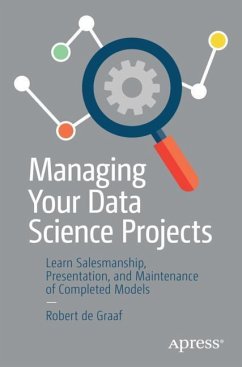At first glance, the skills required to work in the data science field appear to be self-explanatory. Do not be fooled. Impactful data science demands an interdisciplinary knowledge of business philosophy, project management, salesmanship, presentation, and more. In Managing Your Data Science Projects, author Robert de Graaf explores important concepts that are frequently overlooked in much of the instructional literature that is available to data scientists new to the field. If your completed models are to be used and maintained most effectively, you must be able to present and sell them within your organization in a compelling way.
The value of data science within an organization cannot be overstated. Thus, it is vital that strategies and communication between teams are dexterously managed. Three main ways that data science strategy is used in a company is to research its customers, assess risk analytics, and log operational measurements. These all require different managerial instincts, backgrounds, and experiences, and de Graaf cogently breaks down the unique reasons behind each. They must align seamlessly to eventually be adopted as dynamic models.
Data science is a relatively new discipline, and as such, internal processes for it are not as well-developed within an operational business as others. With Managing Your Data Science Projects, you will learn how to create products that solve important problems for your customers and ensure that the initial success is sustained throughout the product's intended life. Your users will trust you and your models, and most importantly, you will be a more well-rounded and effectual data scientist throughout your career.
Who This Book Is For
Early-career data scientists, managers of data scientists, and those interested in entering the fieldof data science
The value of data science within an organization cannot be overstated. Thus, it is vital that strategies and communication between teams are dexterously managed. Three main ways that data science strategy is used in a company is to research its customers, assess risk analytics, and log operational measurements. These all require different managerial instincts, backgrounds, and experiences, and de Graaf cogently breaks down the unique reasons behind each. They must align seamlessly to eventually be adopted as dynamic models.
Data science is a relatively new discipline, and as such, internal processes for it are not as well-developed within an operational business as others. With Managing Your Data Science Projects, you will learn how to create products that solve important problems for your customers and ensure that the initial success is sustained throughout the product's intended life. Your users will trust you and your models, and most importantly, you will be a more well-rounded and effectual data scientist throughout your career.
Who This Book Is For
Early-career data scientists, managers of data scientists, and those interested in entering the fieldof data science








